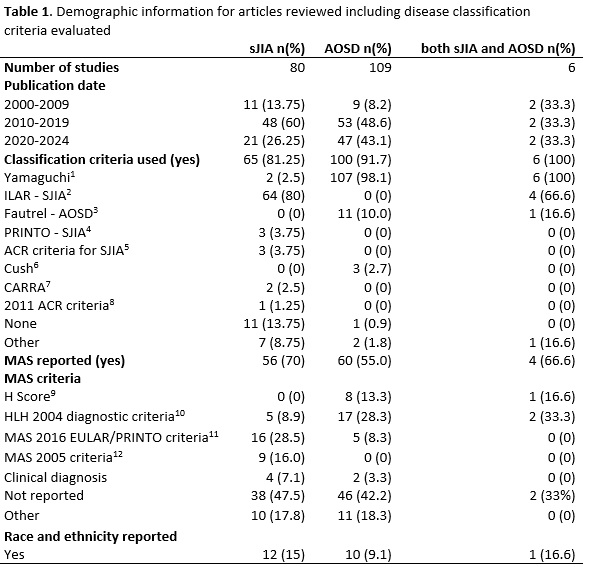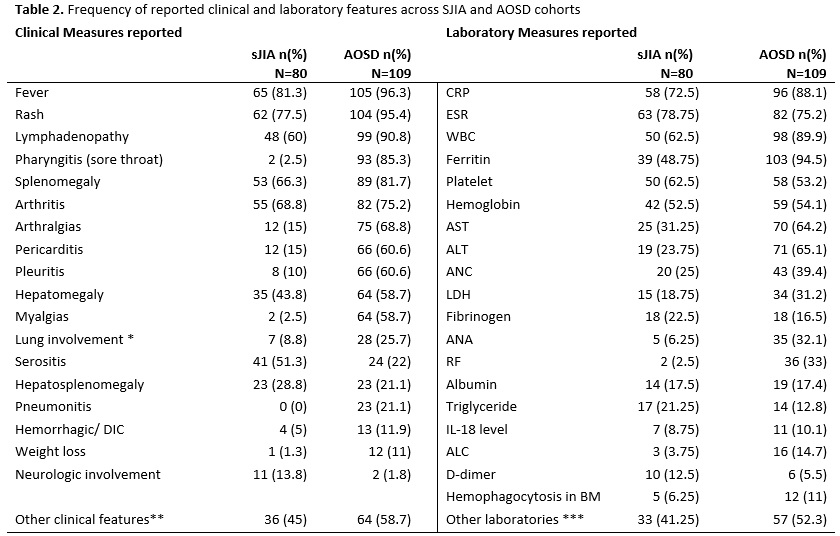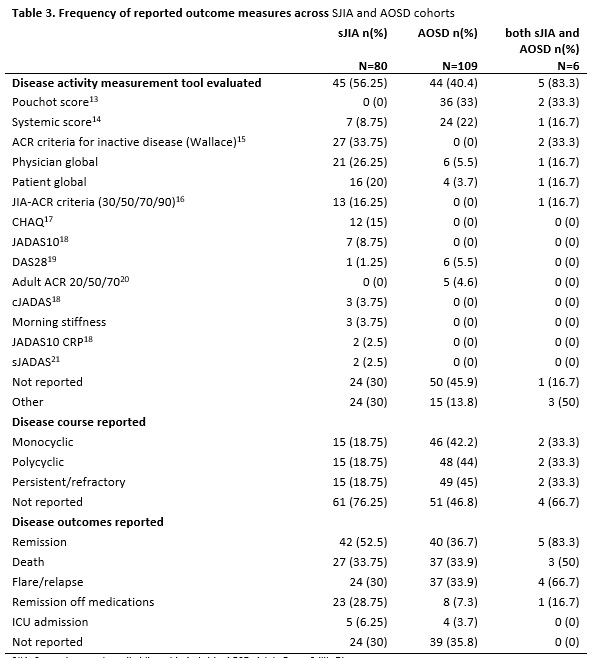Session Information
Session Type: Poster Session A
Session Time: 10:30AM-12:30PM
Background/Purpose: Multinational research is essential to globally improve the management of systemic juvenile idiopathic arthritis (sJIA), improve recognition of rare complications like lung disease, and to harmonize treatment targets and approaches. Although numerous cohorts of sJIA patients are in existence they differ in the clinical parameters and outcome measures collected. Furthermore, while sJIA and Adult Onset Still’s Disease (AOSD) are strongly considered to be along the same disease spectrum, classification criteria differ and clinical tools used are not uniform across the age spectrum. The objective of this systematic literature review was to identify items collected (clinical and outcome measures) across sJIA and AOSD cohorts worldwide. This will help guide the development of a standardized minimal dataset via consensus methodology for Still’s Disease, to help improve patient outcomes through collaborative research.
Methods: Publication search was conducted from 2000-2023 using OVID, PubMed, Embase, and Cochrane Library. We included original articles, in English, reporting sJIA and AOSD cohorts of at least 20 patients, in which clinical features and disease outcome measures were specified. We report article characteristics, clinical and laboratory data used in ≥10% of cohorts, and the most frequently used disease outcome measures.
Results: A total of 195 articles were included (80 sJIA, 109 AOSD, and 6 mixed cohorts), from 35 countries and 6 continents, describing 18,470 patients (9812 AOSD, 8658 sJIA). 60% of sJIA studies were published between 2010-2019, while 43% of AOSD articles published after 2020. ILAR classification [PMID:14760812] was used in 80% of sJIA studies, while 98% of AOSD studies used Yamaguchi criteria [PMID:1578458]. There was not a clear agreed definition of macrophage activation syndrome, with the 2016 MAS[PMID:26314788] criteria used in 28% of sJIA articles and the HLH 2004 criteria [PMID:16937360] in 28% of AOSD studies. Participant race and ethnicity was only reported in 12% of studies (Table 1). There were notable differences in the clinical items collected between pediatric and adult cohorts, with pharyngitis, myalgias, arthralgias, pleuritis, and pericarditis being the most disparate; reported laboratory features were more similar, with the most reported being CRP, ESR, WBC, ferritin and platelets (Table 2). Disease outcome measures collected markedly differed between sJIA and AOSD, Pouchot scoring [PMID:20810496] was reported in one third of AOSD studies, while one third of sJIA articles reported ACR criteria for inactive disease [PMID:15517647]. Disease course was more commonly reported in AOSD articles than in sJIA articles (Table 3).
Conclusion: As expected, wide heterogeneity exists in data reporting across the Still’s disease literature for clinical and outcome measures in both sJIA and AOSD cohorts. Consensus on identification of standardized minimal dataset for Still’s Disease cohorts across the age spectrum is needed to foster cross cohort large scale comparison and collaboration, to improve patient outcomes.
References: 1: PMID: 1578458, 2: PMID:14760812, 3: PMID: 11997716, 4. 180168 5. PMID: 3485433 6. 1780300209 7. PMID: 22290637 8. PMID: 21452260 9. PMID: 24782338 10 PMID: 16937360. 11. PMID: 26314788 12. PMID: 15870661
*Lung involvement not including pleuritis or specified as pneumonitis.
** Peritonitis, abdominal pain, cardiologic involvement.
*** Bilirubin, soluble interleukin 2 receptor, cyclic citrullinated protein, hematocrit, prothrombin time, S100, absolute eosinophil count, partial thromboplastin time, ferritin:ESR ratio, CXCL9, MRP, aldolase
SJIA: Systemic onset Juvenile Idiopathic Arthritis. AOSD: Adult-Onset Still’s Disease. DIC: disseminated intravascular coagulation. CRP: C-reactive protein, ESR: erythrocyte sedimentation rate. WBC: white blood cell count. AST: Aspartate aminotransferase. ALT: alanine aminotransferase. ANC: absolute neutrophil count, LDH: lactate dehydrogenase. ANA: anti-nuclear antibody. RF: rheumatoid factor. IL_18 – interleukin 18. ALC: absolute lymphocyte count, BM: bone marrow
References: 13: PMID:20810496 14: PMID: 27903264 15: PMID:15517647 16: PMID: 9214419 17: PMID: 7986222 18. PMID: 34582120 19. PMID: 18490431 20. PMID: 11053082, 21: PMID: 32829413
To cite this abstract in AMA style:
Correia Marques M, Balay-Dustrude E, Bracaglia C, Twilt M, Onel K, Appenzeller S, Dedeoglu F, Eloseily E, Martinez Jimenez P, Trachtman R, Minoia F, Shenoi S. Reporting of Clinical Features and Outcome Measures in Still’s Disease: A Systematic Literature Review of sJIA and AOSD Cohorts [abstract]. Arthritis Rheumatol. 2024; 76 (suppl 9). https://acrabstracts.org/abstract/reporting-of-clinical-features-and-outcome-measures-in-stills-disease-a-systematic-literature-review-of-sjia-and-aosd-cohorts/. Accessed .« Back to ACR Convergence 2024
ACR Meeting Abstracts - https://acrabstracts.org/abstract/reporting-of-clinical-features-and-outcome-measures-in-stills-disease-a-systematic-literature-review-of-sjia-and-aosd-cohorts/



